| |
"But the nowness (sic) of everything is absolutely wondrous, and if people could see that, you know. There's no way of telling you; you have to experience it, but the glory of it, if you like, the comfort of it, the reassurance ... not that I'm interested in reassuring people – bugger that. The fact is, if you see the present tense, boy do you see it! And boy can you celebrate it." |
| |
Dennis Potter* |
After getting a terminal cancer diagnosis on top of his painful skin and arthritic condition, Dennis Potter was interviewed by Melvyn Bragg. It was broadcast on April 5th 1994. To this day, it remains one of the most startling interviews I've ever seen and the next day I came to work and connected with a friend and found we had both independently ear-marked the same line of Potter's as being worthy of repetition and reflection. It's the wide-open eyes and senses of a man whose death is around too few corners. Potter said "It's a plum tree, it looks like apple blossom but it's white, and looking at it, instead of saying 'Oh that's nice blossom,' last week looking at it through the window when I'm writing, I see it is the whitest, frothiest, blossomest blossom that there ever could be, and I can see it." There was something so immediate, so alive, so startling and true about the word – which of course does not exist – 'blossomest'. Just extraordinary. But who the hell was Dennis Potter, I hear our younger readers ask?
Growing up in the seventies and eighties with anything like a passion for drama (on the big and small screen), you were aware that there were always two types of writer. There was Dennis Potter and then there was everyone else. I mean no disrespect to the David Renwicks, Alan Bleasdales and Andrew Davieses of the world but like Stanley Kubrick, when he was still with us, all other directors were just directors but he was Stanley Kubrick. Some people manage to manoeuvre themselves into exalted places whether by luck or design. Although I lived through Dennis Potter's most controversial and fertile period at my most impressionable age, I cannot point to a moment when the man became 'Dennis Potter'. His fame was accompanied by a morbid curiosity about his health. He was plagued by psoriatic arthropathy (a skin condition with an additional arthritic element) diagnosed when he was just twenty-seven. Some shameful and spiteful critics brought up his illness in their reviews calling him "Crusty" with more than a hint of revulsion. Potter was nicknamed 'Dirty Den' by the tabloid press because of his more salacious interests and after writing the TV series Blackeyes, he was tarred with a misogynist brush, a wronged victim like all those artists who confront an issue only to be accused of what they were confronting. It reminds me of Graham Linehan's courageous stand against those who would deny reality in the cause of trans support. We are living in an era where the truth is subject to SJW review. If you don't know the acronym, then stay ignorant. Let's just say that it was originally a great idea that has mutated into something provably ridiculous. But it persists, Lord, help us. This witch-hunt severed Potter's relationship with long time producer Kenith Trodd and the BBC. But unlike any other wronged artist, you could always see, coldly and forensically, precisely what his critics based their severe judgement on. Potter's heart was never on his sleeve but his art was there for all to see and it focused itself on the extraordinary toxicity, twists and turns of male-female relationships. There is a lot to say about how ridiculous it is to claim to know an author's identity by exposure to her/his work. OK, Dr. Seuss, granted. "That's a slam-dunk," he chanted. But that said, it's not long into the running time of Secret Friends where a part of me thought that "This is so Dennis Potter!"
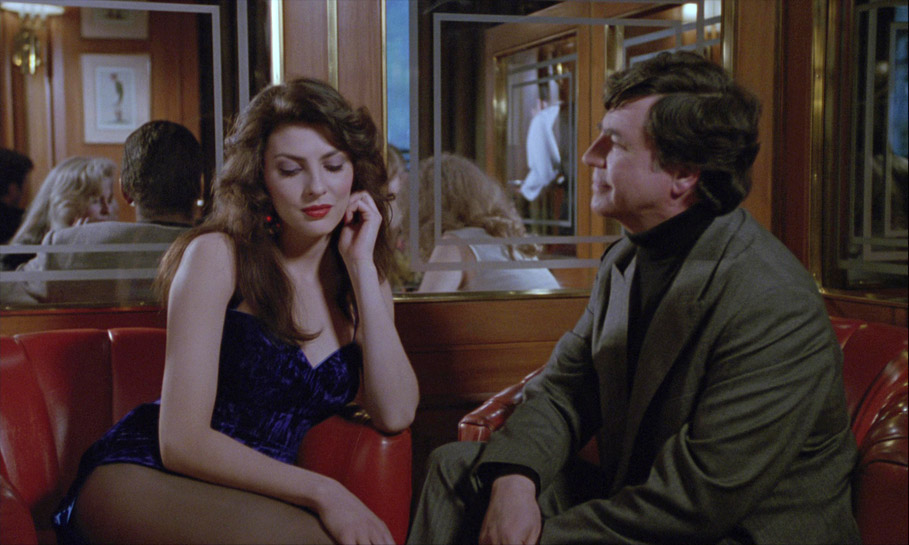
I once said something stupid, and in hindsight, somewhat cringe worthy to Dennis Potter. I had got in touch with Gavin Millar, a producer at the BBC after an episode of BBC's Arena Cinema which led to me meeting Steven Spielberg in Los Angeles on the set of one of his only real failures, 1941. Gavin had directed Cream in my Coffee, one of three Dennis Potter written dramas for ITV in the 80s. Gavin's work so impressed Potter, that he was invited to direct the Potter-penned, Thorn-EMI funded feature Dream Child, the story of the real Alice, the muse for Charles Lutwidge Dodgson (aka Lewis Carroll), the inspiration for the Alice Adventures In Wonderland books. The producer of Dream Child was an extraordinary American gentleman called Rick McCallum. If that name niggles at you, I will put you out of your misery. Rick was George Lucas's front man, the producer of the Star Wars digital makeovers and prequels. I was actually present when Rick and George shared a meal at Shepperton Studios in the 80s. I had no idea George was being so masterfully schmoozed. I was Gavin's assistant on Dream Child and Dennis Potter visited the production office. "And what do you do?" he asked me, the only unrecognisable person in the room. I said "Oh, I'm just a hired hand." "Aren't we all," came Potter's reply and then I just had to add "Ah, but you get paid." I got a sardonic look in return and that was that. I'd like to think I made some sort of impression. Ho hum.
Once past the double whammy of Pennies from Heaven and The Singing Detective, Potter's health started declining. There was a rush to complete final written works and these failed to reach the lofty heights of his two masterpieces. How could they not fail? That bar was way up there. Enter actress Gina Bellman whom Potter cast as Blackeyes in the series of the same name. It's been written that she became a Muse of sorts embodying the perfect female form (she looked like a more angular Gal Gadot with extraordinary wider eyes). In Secret Friends, she's Potter's perfect sexualised mantrap and a soul tamed into psychopathy. Potter adapted his novel Ticket To Ride and all the talent and good will in the world cannot take a psychological thriller so comfortably contained on the page and concretise it for the cinema. Levels of past, fantasy and reality collide in a very Potteresque way but unlike the literal bed of Marlow's confinement in Detective, we don't have an anchor from which to explore the different and fractured states of mind of the hero of the piece John, played by Alan Bates. Yes, we can accept that the British Rail First Class train carriage is the 'real' now (a view somewhat disabused by one of the final tracking shots) while John admits he doesn't know who he is but all realities (including the real one) are presented with no transitional clue so it becomes a latticed lasagne of layers and that's not the easiest narrative to get a grip on nor to pronounce. You'd need a fork adapted in four dimensions to really consume it.
As far as I can make out (and as a Potter fan, I should have a head start more than most), a troubled man on a train admits to not knowing who he is. Two barely helpful businessmen opposite try to help him while a British Rail waiter worries (Basil Fawlty style) that he may have been made ill by the fish he'd been served. John then goes through a series of past memories and fantasies, which involve the fantasies of other people in his life just to really confuse the situation. His wife, the beautiful Helen, is frustrated by her husband's state of mind and seems to need to play the role of prostitute to get him to join in the physical fun of marriage. John's past comes back to haunt him, with his father, a man of the cloth, and compliant mother impressing a form of education on their offspring that has never been particularly useful. John becomes even more unhinged and his wife resorts to seduction and violence to satisfy her frustrations. These incidents may or may not be real. I'm fairly sure we're not supposed to 'know' but to enjoy our own reading of what's offered as the film takes us where our own minds might wander. As I mentioned, it's a tricky film to summarise. It's not for nothing that Potter's own summation of the film includes the quote "Some people might like it. Most won't." I think I bruised my nethers sitting on that fence for way too long.
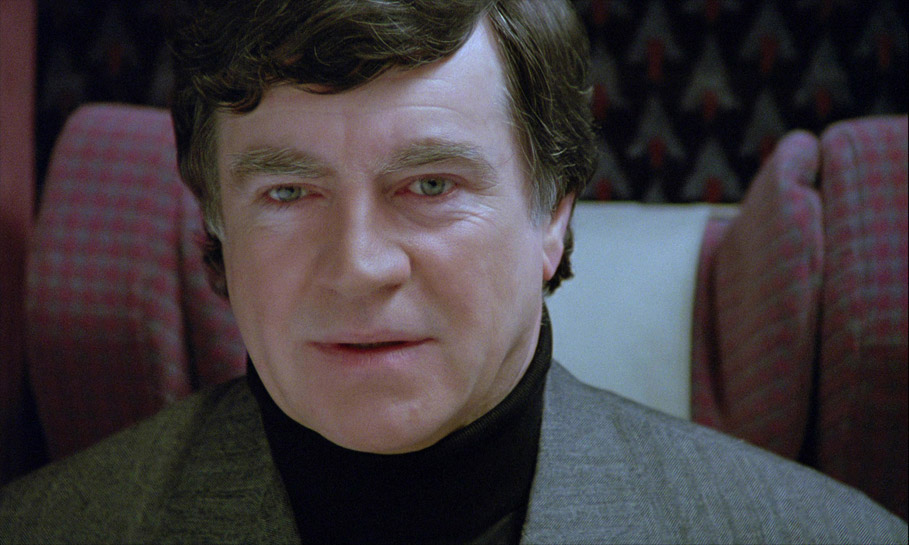
Alan Bates in the lead has by far the least sympathetic role. His 'John' (with a nod to a sex worker's nickname for clients) is anguished for most of the running time. It's not a good state for any performer to be in for so long. There were moments where you just wanted to grab him by the shoulders and deliver some strong words of course correction. His 'Alan Bates-ness' gets in the way just a little. What was mannered but winningly attractive as a young actor in, for example, Georgy Girl, is here a little less heart warming, like watching a middle aged, no longer whippet thin gent, squeeze into skinny jeans. The tics are there but there's more effort behind them. He's as charming as Alan Bates can be but you feel that what was once light playfulness is now heavier lifting. Let's not forget that he is also playing many versions of himself, real and imagined to an audience that is not given enough clues to separate the many personas. Gina Bellman's career was still just starting and as a viewer you get the impression that she was still discovering herself, an ingénue with stabilisers, a little gauche and inexperienced. Was it Potter's enthusiasm for his leading lady, his uncritical embrace of her fantasy potential at the root of her performance not being entirely convincing? As a first time cinema director (Potter directed Bellman on TV in Blackeyes), it's easy to cast Potter adrift as a brilliant scribe but less able director. Details may be difficult to spot on set but there are a few moments when the young John's eye line catches the camera as it moves in front of him at his bedside. Digitally, this would be a simple correction today but I guess in 1991, you had to live with it. There's a simplicity to the staging of the scenes that calls attention to Clare Douglas' editing, the oh-so important craft when dealing with multiple realities in a narrative. But without an anchor, an established baseline of reality, there's no broad understanding of the fantasy. And the biggest problem about not knowing what's real and what isn't is that you tend to care for absolutely no one.
There are small moments to savour, when Potter's almost whimsical wit plays seemingly at odds with the more serious events unfolding. The two businessmen (played by Ian McNeice and Davyd Harries) watching Bates disassemble in front of them seem to be in sync eating and drinking, a sub-narrative Vaudeville act. They carry on their performance in other locations (one must assume fantasy locations as it seems pushing the limits of even Potter's reality that the same two strangers would be accompanying Bates wherever his mind takes him). Frances Barber plays Bate's neighbour Angela, a woman whom we are invited to assume has her eyes on and claws into the troubled protagonist. She plays sexual predator with a languid candour, a woman assured of her own allure and only ever bested by another woman's (fantastical?) rage. John's parents, just about as awful a pair of characters anyone could dream up, are wonderfully cast (no disrespect to Colin Jeavons and Rowenna Cooper who both play them with relish). At one point (fantasy?) John's vicar-father enjoys a preposterous dance with his wife. If she were any more emotionally straitjacketed, she'd be a mute statue with darting, uncomprehending eyes. A Potter staple is employed to much less of an effect this time around. His passion for music of the past to comment on the dramatic present deserts him here. He's chosen to or forced to use the same piece, presumably written by composer Nicholas Russell-Pavier very much in keeping with his beloved 30s and 40s compositions. Titled (I presume) 'Secret Friends', it doesn't seem to have the ironic bite that most of the Pennies and Detective songs had.
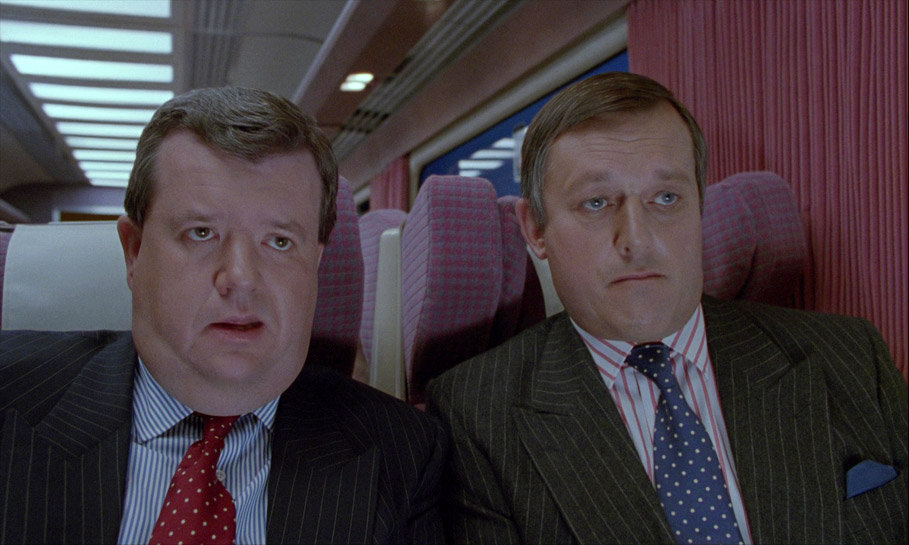
Secret Friends is a real curiosity. Its deliberate jettisoning of narrative clarity could be seen as a thrust to the ground, gauntlet challenge to some, a jarring mess to others. I'm still on the fence. I can't ignore Dennis Potter's point of view because I value it too highly. But he has objectified Gina Bellman as she works out in a leotard in front of a stained mirror and there's no argument that could suggest another reason for shooting her in such an objectified way. But Potter was also about challenging his audience and perhaps I'm complicit in this challenge. That's the thing with Potter. To quote Chuck Berry, "You never can tell…"
I'm scratching my head why Potter would choose the 1.66:1 aspect ratio for his theatrical debut. Was he that connected to the television medium and frame? The picture quality is terrific with excellent contrast ratios throughout and striking choices of colour when the drama demands it. The picture is almost completely free of imperfections.
What most surprised me was the effectiveness of the stereo soundtrack. For a drama, and a complex one at that, you don't expect too much fuss to be taken over the sound but the stereo track does a lot of work carefully placing various sounds including the all-important dialogue, all of which is crystal clear.
There are new and improved English subtitles for the deaf and hard-of-hearing.
Bon Vivant (2020): actor Ian McNeice recalls working with the film's writer-director, Dennis Potter(5' 35")
McNeice's memories are well worth listening too however short. It's no surprise to learn that the actors had to cleave to the script right down to the pauses. This reminds me of the Cohen Brother's screenplays. But his respect for Potter meant that he was happy to comply. The story about the 'rocking' set is a real treat. If MacNeice leans back he slips out of focus but that's hardly a criticism. The actor acknowledges Potter's deteriorating health while still being warm and interested in his cast, something most people suffering as much as Potter did may not have the character to do.
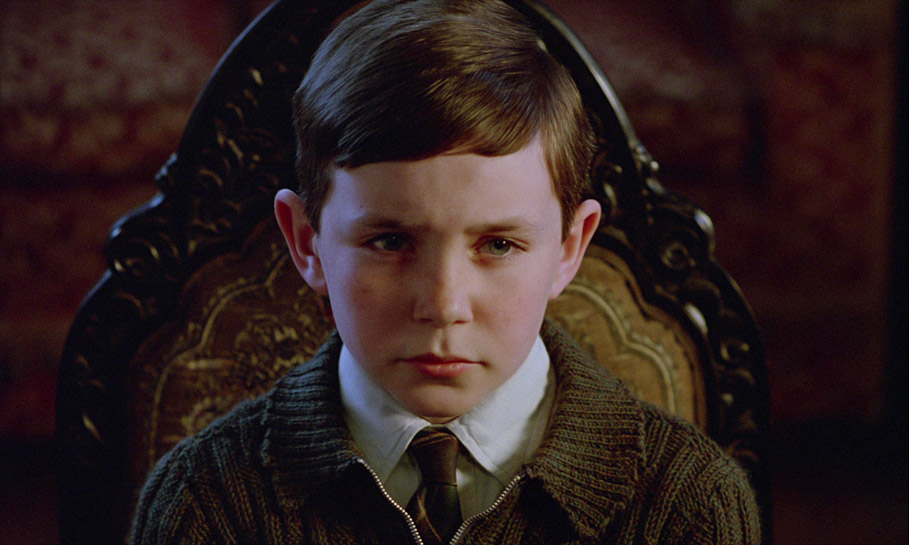
Keeping Secrets (2020): analysis of Secret Friends by Graham Fuller, editor of Potter on Potter (9' 19")
This consists of a mid-shot of Fuller interspersed with clips from the film. It is almost a critic's plea for Potter's film to be understood and not dismissed. His argument has some weight. Secret Friends is all too easy to dismiss because it is confusing and that confusion is part of its DNA. I have often laboured under the misapprehension that if I didn't get something then there was something not right with my own perception. But Potter really tests that bit of knowing self-deprecation. As I said in the review, it's not clear what's 'real' but Fuller underlines the irreconcilable idea of Freud's theory of women, the Madonna and the whore as passed through Potter's own sensibilities. I've never been able to understand why some see such polarised roles as being incompatible with each other. As a wise person once said "When you're hot, you're hot. When you're not, you're not." I'm also entertaining how a man might be classified in the same way. The Provider and the Beatty? Doesn't really scan, does it? But Secret Friends needed this extra and Fuller does a great job of essentially asking for us to delve a little deeper and not be put off by the film's labyrinthine structure.
Original theatrical trailer (3' 00")
Could this be a new trailer made for this release? I suppose because it's in HD, it feels less like an early 90s effort to sell an almost unmarketable film and more like an 'after the event' effort. The graphics seem too modern. Hang on. I'm going to see if there's a nice scratchy SD trailer online. Nope. Snatches of the film can be found in uploads of VHS trailers but the original trailer is nowhere obvious on YouTube. If this is a shot for shot reconstruction of the original trailer then I'm wrong and happy to be so. I never want to be wrong longer than I have to be. It's intriguing enough as an appetite whetter but I didn't get to see this trailer at the time and even as a Potter fan, I wasn't aware or made aware that this was his first and last cinematic outing.
Image gallery: publicity and promotional material
This features 48 colour stills of varying shapes, 1 behind the scenes of Potter and 8 screens of 15 pages of the press release. The poster as featured on page 34 of the booklet is the last image.
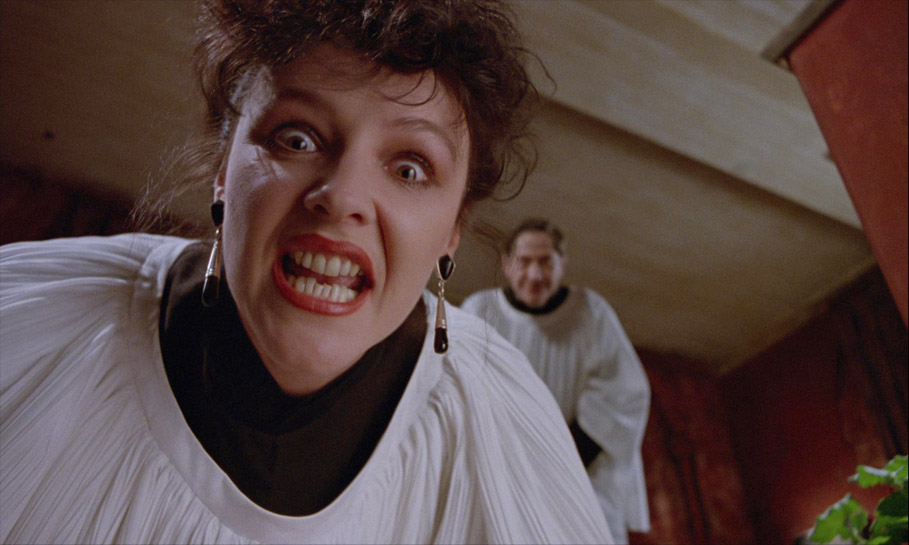
Limited edition exclusive 36-page booklet with a new essay by Jeff Billington, Dennis Potter on the making of Secret Friends, an extract from Potter on Potter, an overview of critical responses, and film credits
Jeff Billington's Personality Crisis is a terrific and well-informed piece on the making of the film and the context in which it was made. There are facts presented here that sometimes derail previous assumptions about the film but then life and truth is Rashomon-ic enough as it is. Dennis Potter and the Making of Secret Friends is a Potter interview taken from the production notes of the film's Press materials interspersed with his crew's memories from Tom Hibbert's Empire magazine interviews and extracts from Ginny Dougary's interview for the Sunday Times Magazine rather nicely headlined as Potter's Weal… Again, there are many gems sprinkled in with this lot, not least that Potter found out working on the film that he was not a recluse but a collaborator. Film directors tend not to be reclusive. Writer Germaine Greer comes to Potter's defence in her own way, which is a small ray of light in the general anti-Potter gloom that descended after Blackeyes.
Next, there is an extract from Potter on Potter, a book based on extended interviews edited by Simon Fuller, the staunch defender of Potter and his work in the earlier reviewed extra. The line of Potter's that Belisha beacons off the page is this; "But there is no prescription you can write; it's a fact that exists, and it's true of human relationships, which have to contend with both our animality (sic) and our grace." Lastly there are the critical reactions, all fairly damning, from Empire magazine's review, Vincent Canby's in the New York Times and Jonathan Romney's dismissal in Sight and Sound of Potter's habitual tropes and the leering of Bates and the "ingénue mannerisms" of Bellman.
Secret Friends challenges you not to appreciate it. I'm reminded of what Laurie Anderson once introduced as 'Difficult Listening Hour…' It's hard going, being a film that fractures at the drop of a pork pie, sending shards of 'now', 'then' (now and then) and 'imagined' at the audience which, if I were the audience, struggles to 'get' what the creator of the work was intending. I am quite prepared to take responsibility for not getting what Potter was communicating. But as my own viewpoint seems to be mirrored by the vast majority of those puzzled by the film, I don't feel too defeated by this work of a man who knew he was dying although not in the sense that all of us know that we are dying. Woody Allen's remark in Love and Death comes to mind… "Isn't all mankind ultimately executed for a crime it never committed? The difference is that all men go eventually, but I go six o'clock tomorrow morning. I was supposed to go at five o'clock but I have a smart lawyer." Bless you, Dennis for your extraordinary work.
|